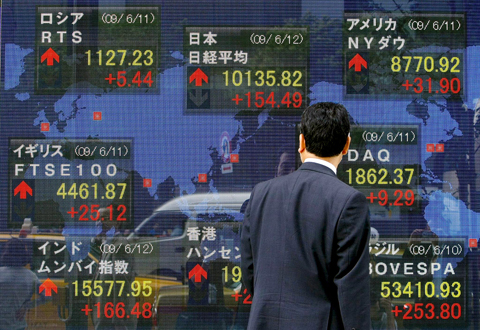China’s retail sales and industrial output grew strongly last month as the government spent heavily on a stimulus to boost growth in the world’s third-biggest economy as exports plunged.
Retail sales rose 15.2 percent compared with May last year, up from April’s 14.8 percent growth rate, the Chinese National Bureau of Statistics reported yesterday. Industrial output rose 8.9 percent, rebounding from April’s lackluster 7.3 percent and exceeding March’s 8.3 percent rate.
Beijing is trying to shield China from the global slump by boosting domestic consumption with a 4 trillion yuan (US$586 billion) plan to inject money into the economy through spending on building highways and other public works.

PHOTO: EPA
Yesterday’s data highlighted the economy’s heavy reliance on government spending to maintain growth and the gap between stimulus-financed industries and struggling fields with exposure to plunging exports.
Output of stone and other minerals used in stimulus-financed construction rose 14.7 percent last month, while auto production jumped 29 percent, boosted by sales tax cuts and other government incentives for buyers. Among industries exposed to exports, output of computers and telecommunications equipment grew by just 4.3 percent.
Analysts also point to healthy retail sales as another possible source of growth, though consumer spending is still a relatively small portion of China’s economy.
The government has set a growth target of 8 percent this year, though the economy expanded by only 6.1 percent in the first quarter — its slowest rate since the 1990s, but the strongest for any major economy this year. The World Bank says it expects 6.5 percent growth for this year and private sector economists say the economy is improving.

EXPRESSING GRATITUDE: Without its Taiwanese partners which are ‘working around the clock,’ Nvidia could not meet AI demand, CEO Jensen Huang said Taiwan Semiconductor Manufacturing Co (TSMC, 台積電) and US-based artificial intelligence (AI) chip designer Nvidia Corp have partnered with each other on silicon photonics development, Nvidia founder and CEO Jensen Huang (黃仁勳) said. Speaking with reporters after he met with TSMC chairman C.C. Wei (魏哲家) in Taipei on Friday, Huang said his company was working with the world’s largest contract chipmaker on silicon photonics, but admitted it was unlikely for the cooperation to yield results any time soon, and both sides would need several years to achieve concrete outcomes. To have a stake in the silicon photonics supply chain, TSMC and

‘DETERRENT’: US national security adviser-designate Mike Waltz said that he wants to speed up deliveries of weapons purchased by Taiwan to deter threats from China US president-elect Donald Trump’s nominee for US secretary of defense, Pete Hegseth, affirmed his commitment to peace in the Taiwan Strait during his confirmation hearing in Washington on Tuesday. Hegseth called China “the most comprehensive and serious challenge to US national security” and said that he would aim to limit Beijing’s expansion in the Indo-Pacific region, Voice of America reported. He would also adhere to long-standing policies to prevent miscalculations, Hegseth added. The US Senate Armed Services Committee hearing was the first for a nominee of Trump’s incoming Cabinet, and questions mostly focused on whether he was fit for the

IDENTITY: Compared with other platforms, TikTok’s algorithm pushes a ‘disproportionately high ratio’ of pro-China content, a study has found Young Taiwanese are increasingly consuming Chinese content on TikTok, which is changing their views on identity and making them less resistant toward China, researchers and politicians were cited as saying by foreign media. Asked to suggest the best survival strategy for a small country facing a powerful neighbor, students at National Chia-Yi Girls’ Senior High School said “Taiwan must do everything to avoid provoking China into attacking it,” the Financial Times wrote on Friday. Young Taiwanese between the ages of 20 and 24 in the past were the group who most strongly espoused a Taiwanese identity, but that is no longer

A magnitude 6.4 earthquake and several aftershocks battered southern Taiwan early this morning, causing houses and roads to collapse and leaving dozens injured and 50 people isolated in their village. A total of 26 people were reported injured and sent to hospitals due to the earthquake as of late this morning, according to the latest Ministry of Health and Welfare figures. In Sising Village (西興) of Chiayi County's Dapu Township (大埔), the location of the quake's epicenter, severe damage was seen and roads entering the village were blocked, isolating about 50 villagers. Another eight people who were originally trapped inside buildings in Tainan